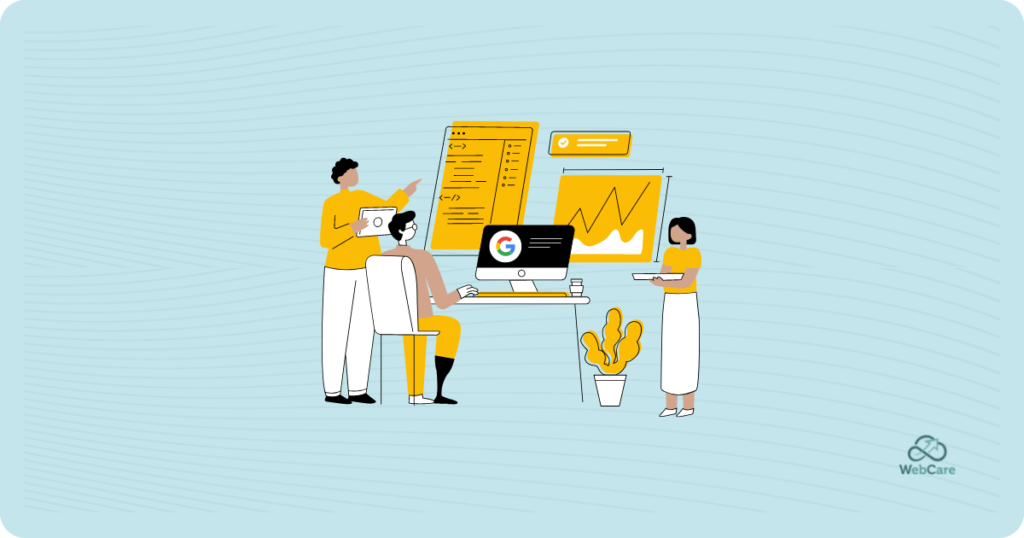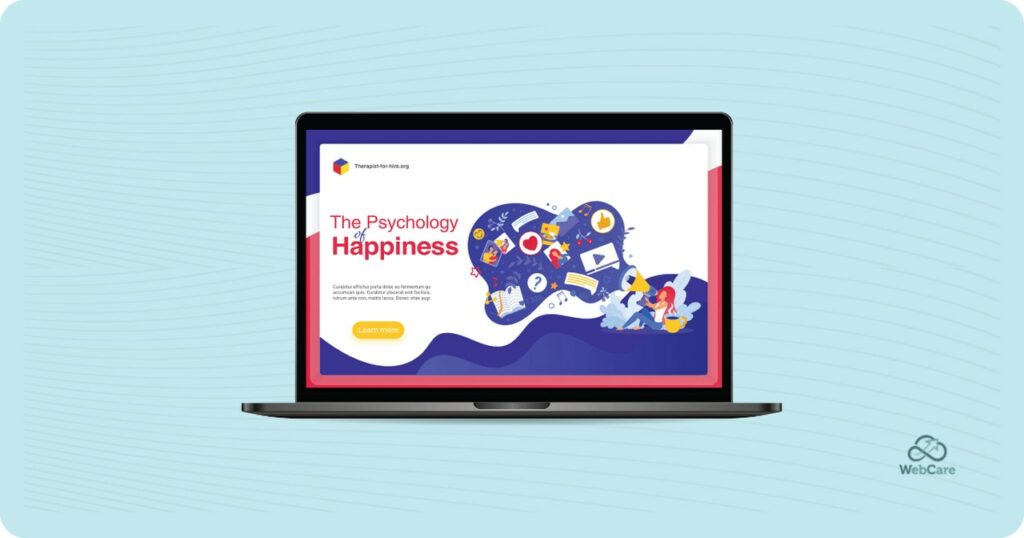What Should I Blog About as a Therapist? 10 Practical Ideas

A common question many therapists ask is, ‘how do I find clients?’ But the right question that should be asked is:
How do clients find me?
Have you heard of the bakery shop that went around asking people if they wanted to buy bread? Neither have I.
As a coach or therapist, you want your clients to find you, and not only that, you want your ideal clients to find you. Those that fit your niche, and for whom you can make a positive difference in their lives.
To do that, you not only need a website, but you also need a blog. A blog enables you to attract the right people to your website, where they can get to know you and your service offering, and at an opportune time, sign up.
But an immediate question that pops up is ‘what should I blog about?’ and what a brilliant question it is, as there’s so many exciting options!
So let’s get started. I’m going to explain what you should blog about, and if you are still uncertain if blogging is the thing to do, first read our blog post ‘why blog?’ for interesting statistics and research.
What Should I Blog About?
Below, you will find a list of ten suggestions that will form the basis of what you can blog about. But first, drag a pen and paper closer so the moment inspiration strikes, you can write it down. Hopefully, at the end of this blog post, you will have at least 20 specific ideas on what you should blog about.
1. Answer questions & provide value
In 2022, Google launched a new core update to their search algorithms, called the ‘Helpful Content Update.’ Google wants blog owners to provide helpful and accurate information to readers.
By providing useful information in a blog post, your ideal client will find you when they do an online search. However, you have to really understand your client, and understand the type of questions they might type into the search bar.
Imagine queries like ‘why do I struggle to breathe sometimes?’ Some people might not even know they have anxiety, and a helpful blog post can provide them with useful information.
Avoid the pitfall of writing too much about yourself and your practice, you can leave that for your About page. Think about questions people might ask without jargon. Questions they might type about their symptoms, problems or the help they think they need.
Sample questions can be ‘how to get a better job’ or ‘does aromatherapy really work?’ or ‘can I improve my confidence?’ Really put yourself into your ideal client’s mind and consider questions they may ask, and write a blog post answering those questions.
2. User guides
Guides about anything are always valued and searched for on search engines. For that reason, wikiHow has gained such immense popularity.
Consider any ‘How to’ topic as a way to reach your potential client. If you are a fitness coach with a niche focus on mountain bikers, you can write about how to prepare for a long distance outing during winter.
Besides how-to guides, you can create beginner guides or even ultimate guides filled with valuable information, if you are up to a challenge.
Really consider what will give your ideal client valuable information, and write with them in mind. Our own post ‘How to Guard Your Blog’s Reputation’ has the same intention – providing valuable information to our readers.
3. Listicles
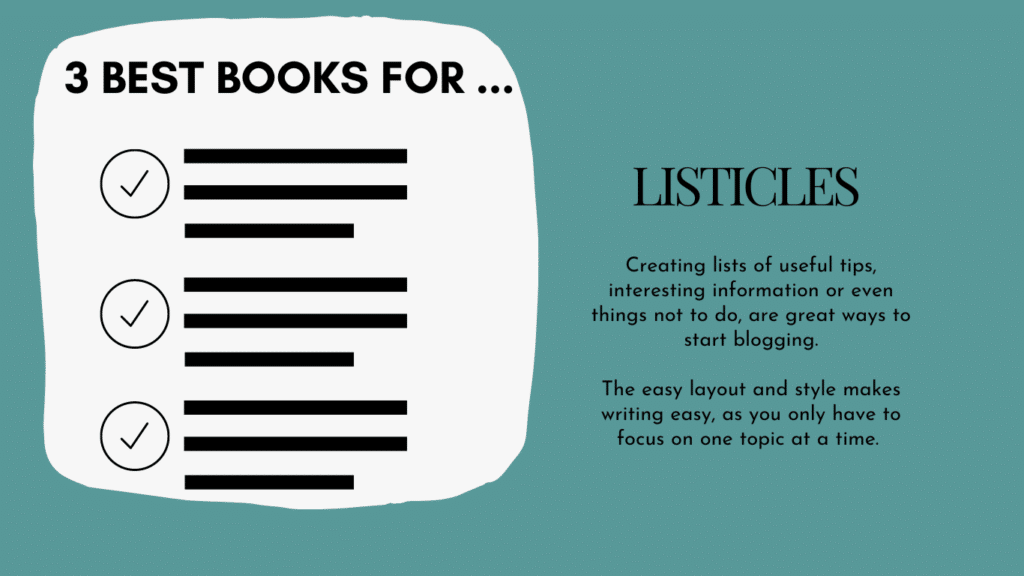
Lists can be super helpful, packed with advice in an easy-to-read format. Your imagination is the limit and I encourage you to think outside of the box.
Here’s a suggestion if you are a career coach: list career options for active people who would dread sitting in an office. These options are endless, and any therapist or coach can conceive listicle ideas that would benefit their clients.
Even a list of ‘things not to do…’ can gain traction, and it is also a great post to share with new clients, or on social media.
One of our articles – 5 SEO Don’ts Blog Owners Must Avoid – uses this approach.
4. On-boarding questions
Whenever you meet with new clients, or even prior to engaging with them, there will always be similar questions they will ask you. Keep a list of these questions and answer them in friendly blog posts.
Using information you have gathered from existing clients, you can make the on-boarding process for new clients so much easier by already answering those frequently asked questions in your blog.
5. Recommendations
Recommending books that will benefit your clients is an easy topic to approach and write about.
Every discipline has a great selection of books honed for the beginner right through to the scholar, and you can most probably think of a few right now.
You could combine this with a listicle, something like ‘3 Best Books to Help You Overcome Debt.’
But you need not stop at books. You can recommend podcasts, YouTube videos and even other service providers.
As an example, if you are a financial coach, but find many people approach you because they want to get out of debt, you can write a blog post about financial counseling and recommend a suitable service provider to such readers.
6. Case studies
Writing about case studies can make for mesmerizing reading. I vividly recall the book titled ‘The man who mistook his wife for a hat’ by the brilliant neurologist Oliver Sacks.
Your ideal client, who may battle with a similar problem, will find a case study interesting and a great way to connect with you, seeing that you have a firm understanding of the difficulties they face.
7. Speak about the outcome
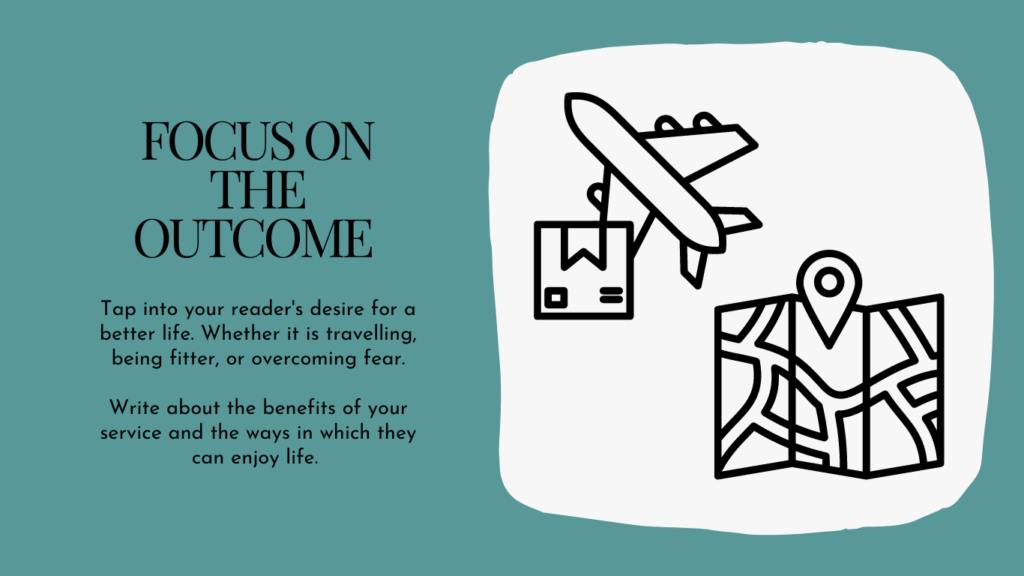
One of my favorite approaches while reflecting on what I should blog about is considering the outcome – the benefits clients will experience.
What will your client gain from your service? A new and improved life after weight loss? More energy? Greater self-esteem? What about financial freedom if you are a wealth coach? How about being able to have a picnic for those who have overcome a fear of open spaces?
Think about the benefits, the end goal you offer your clients. Write about that to instill excitement and let them envision the doors that therapy, counseling or coaching will open in their currently closed world.
8. My story
Sharing your own story can have a marked impact on a reader, and have a much more memorable effect than reading about symptoms and solutions.
By connecting with your reader on their own level, and sharing how you may have struggled as well before you became the person you are now, instills hope and builds a connection.
People want to work with people. Showing them your humanity and sharing your own story can be the icebreaker that makes them want to work with you.
9. Templates, worksheets and give-aways
Provide something ‘extra’ in a blog post, such as a template or worksheet. If you are a massage therapist, providing a reflexology map of hands, with your logo of course, is a valuable give-away that a reader can benefit from.
You can ask a graphic designer to help you create free PDF worksheets with breathing exercises or a meditation guide.
Your blog post can focus on the use of the meditation guide, or the use of reflexology points, or the importance of breathing exercises.
These posts provide helpful information, and helpful content is what Google encourages.
In this blog post – Google’s Helpful Content Update – I have included a free spreadsheet with instructions to be used to assess your own blog to see if it is really helpful or not.
Think about any exercise or diet or worksheet that you are already handing out to clients, and convert it into an online version, then write about it!
10. Videos & podcasts
Consider any media items you already have in your arsenal and repurpose them as blog posts. If you already have a fitness video (or ten) on YouTube, take the introductory video and create a blog post where you embed the video in the post.
In this blog post, describe the exercises and important points that the viewer should consider. Explain your methods and techniques using keywords that Google require, such as ‘yoga for beginners.’ More on keywords in the next section.
Podcasts embedded into a blog post can be just as useful, as long as you add the narration or a long summary. Consider that your prospective client might have impaired hearing, and would want to read the valuable information you share in the podcast.
Only embedding the video or podcast in a blog post does not give you the keywords that are needed for readers to find the blog post. You have to write content too and not just embed!
4 Important Blog Writing Pointers
“You need the right kind of content to reach the right kind of client.”
Quality vs quantity
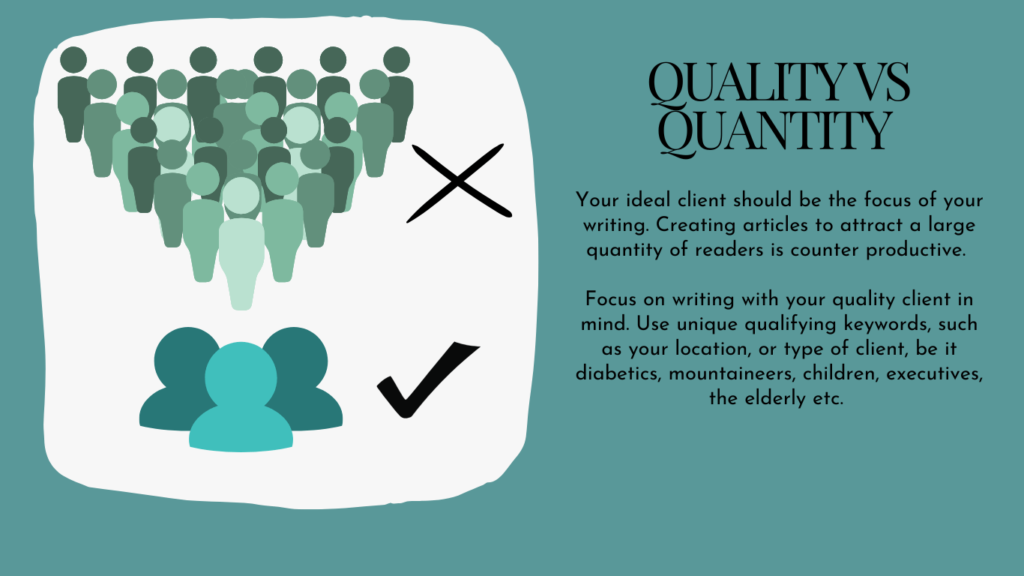
If you are asking yourself ‘what should I blog about,’ I want you to imagine your ideal client. Your ideal client is the person you can help the absolute best. Someone that fits perfectly into your niche service you provide.
Keep that person in mind with all the blog posts you create. Let’s use an example to illustrate.
Let’s say you are a Positive Leadership Coach, and your niche focus is C-suite leaders in Chicago.
You could write a blog post about ‘How to build your strengths in leadership’ but that would attract a broad selection of people, who could ultimately waste your time as they are not in your niche focus or area.
Let’s try instead: “How to build your corporate leadership strengths in the Chicago jungle.” It’s much more focused, and throughout your article you address corporate leadership, as that is the reader you want to attract.
Here is another example:
You are a nutritionist, but you only work with diabetics. A post like ‘How to lose weight’ will attract a lot of readers, but not necessarily the right readers. A post titled ‘How to lose weight if you have Type 2 Diabetes’ is crystal clear on who you can help.
Ideally, you want to attract the right quality readers, not necessarily a large quantity of readers. Imagine if 10% of the 1000 readers who find you want to sign up. You would sit with 100 people to correspond with to see if they are a good match for your niche service or not. A bit overwhelming?
But if you let the right people find you, even if the quantity is less, they will fit your ideal client profile better. You can immediately sign them up rather than waste time sifting through a large crowd of unsuitable people.
Evergreen content
When writing your blog post, keep in mind that it is going to be on the web for five or more years. If a person reads it two years from now, it must still seem relevant at that point in time. Avoid mentioning current news, such as a war, a pandemic, or an energy crisis that could make your post seem dated when read in the future.
Avoid mentioning prices, as prices change, and be discerning regarding dates you use. If you want to mention the Best Aftercare Services in Cork in 20XX, since you are an aftercare social worker, you could add the current year, but have to update the article each year, which is a good practice, regardless.
When mentioning a year, like ‘last year,’ this would become erroneous a year from now. While sharing your story, rather use a specific date such as ‘in 2015 when I was too obese to leave the house…’ while if you said 5 years ago, that would again be incorrect soon.
Consider your future readers when mentioning any date or event. How will they interpret your blog post at that future point?
KISS
One of my favorite sayings is KISS – Keep it simple, stupid. (Meaning me 😜)
Although your prospective clients may be highly educated, you would not want to alienate them with technical jargon and over the top acronyms.
Keep your writing conversational and easy to read and skim.
A practical tip I’ve given my writers is to imagine their favorite niece or nephew sitting by them while writing. When they need to explain a challenging concept, break it down into something simpler which the youngster can understand. Being able to do this gives value to your reader, who will walk away feeling they have truly learned something.
I strongly recommend reading the blog post Blog Formatting Tips to Better Engage Your Readers. Once you understand the writing style and format that makes a blog post great, your writing will also adapt to an easier writing style.
Call To Action
Every blog post should have a call to action – CTA. You can have more than one, they can be spread throughout your blog post, or you could have a simple conversion option at the bottom of your article.
Either way, you want your reader to sign up for a newsletter, or contact you, or subscribe. To take some kind of action based on reading your post.
While reading about the ten things you should blog about, you may have wondered why you should give away free information. The reason is that the reader will always want to know more, and eventually reach out to you.
If you have recommended three books for getting out of debt, there will be a point where the reader realizes he or she needs professional help, and financial counseling is all that can help. And you will be the first person they consider.
Having that call to action in your blog post where they can sign up for a newsletter or schedule a consultation is important to include.
Why You Should Blog What You Blog About
Why blog? And why blog about these ten pointers?
Let’s quickly take a step back and look at the bigger picture. Whether you are a counselor or a coach, you probably have a stellar website explaining who you are, showing your qualifications, and showing the services you offer.
But with millions of websites on the internet today, your website with these basic pages are hardly a blip on the radar. You need to expand your footprint – that means, create more impactful content on the internet.
Now, you could add a few more pages to your website, but soon you will struggle with your menu and ideas on showing people what a great service you provide.
This is where a blog comes in. Blog posts enlarge your footprint on the internet. It gives you ample opportunities to write about the difference you can make and allows prospective clients to find you.
They do this by searching on Google and other search engines. Searching for ‘how to’ guides or answers to questions, recommended books, free worksheets and more. These search terms are what we call ‘keywords.’
“For our business at PositivePsychology.com, almost all of our search traffic comes in through the blog posts that we have published. They are the most common, and the easiest, kind of content to create for SEO purposes, and a wonderful way to offer value.”
Seph Pennock, 2022, p. 133
Keywords & SEO
Search Engine Optimization, or SEO for short, is the process of improving your website so that people who search for your keywords find your website first rather than the website of your competitors.
For that reason, keywords, what people type into the Google search bar, are extremely important. These keywords are what you must think about and use to create your content.
Remember the example ‘Why do I struggle to breathe sometimes?’ – that entire sentence is what we call a keyword. And every keyword article you write will grow your website’s footprint, making it easier for people to find you and learn about your service.
Touching on topical authority
We’ve stepped back and looked at the bigger picture, and now we are going to fast forward into the future.
So you have created your blog, your ideal clients are finding you, but there is still the question of why should they trust you?
Your reader needs to see you as a thought leader – an expert in your niche. You need to clearly show that you have topical authority.
If you are a wellness coach, every blog post should touch on wellness and related areas. Your listicles, recommended books, everything should revolve around this niche focus.
By blogging about your expertise, you illustrate to the reader that you are knowledgeable in this area and they can trust your content, and trust you enough to sign up for your service.
Which brings us to the next and final point.
Gain trust, show expertise and authority
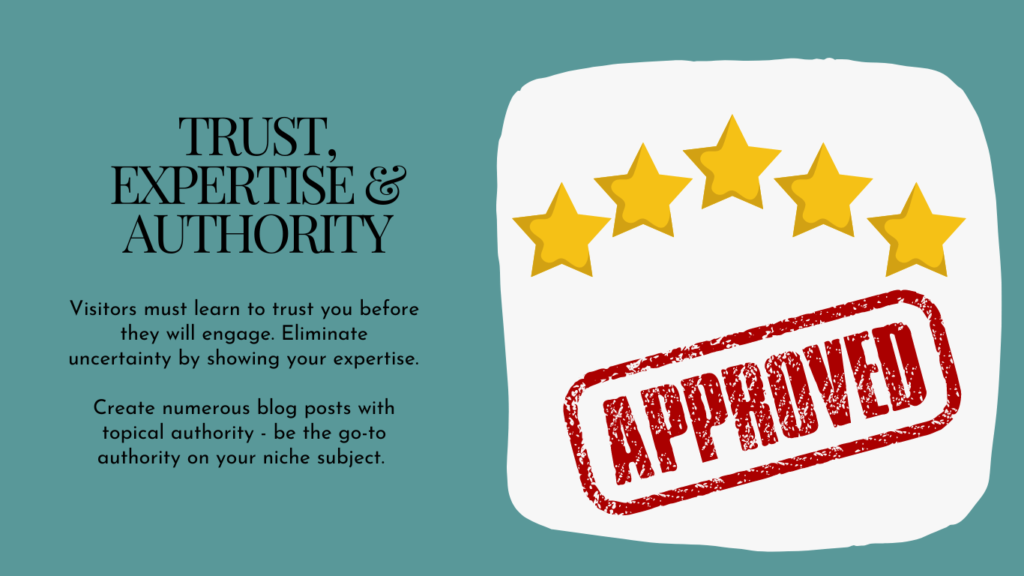
At the end of the day, you want to gain the trust of your reader. Your blog posts must show your expertise and that you are an authority on the subject.
You can use case studies, testimonials, statistics, and your own story to amplify your authority, all in blog posts.
Steer clear from being a generalist, it will not help you attract your ideal client. Be specific in mentioning your niche focus and always keep that ideal client in mind while writing.
Show how you can help a specific type of client, be it diabetics, executives or mountain bikers, and your content will resonate with the right reader.
Do not fear giving away valuable information, whether as guides, diets, exercise routines, worksheets or techniques. Readers appreciate these and will come back for more, or even better yet, sign up for your newsletter. That helps you build an even closer relationship with your potential client and your email list.
Remember, Google is focused on ‘helpful content’ and useful information and will list a website providing good information higher in the search results. But there is a caveat to that too!
If you write about anything to do with finance or healthcare, then Google will scrutinize your blog posts a bit more than usual. This has to do with YMYL – Your Money or Your Life content.
Google wants to ensure that the information provided is factual and safe, it cannot lead the reader to financial loss or harm from following wrong health advice. For more on how that works and why it is so important, read this blog post about the meaning of YMYL.
So, considering that your information is helpful, safe and correct (think YMYL), you have authority, and social proof shows that you are effective in the services you provide, then Google will rank your blog post higher in the search results – helping more people find you.
Frequently Asked Questions
Below we share a few short answers to regular FAQ’s we’ve come across.
Conclusion to What Should I Blog About
Blogging can be a wonderful tool to showcase your expertise, your willingness to help others, past results, and topical authority. In fact, there should never be a day that you wonder ‘what should I blog about?’ Just these ten pointers will keep you blogging forever, and these are just primers.
But this brings us to another point – consistency. Consistency is key! Every pro athlete and talented musician knows that consistent practice made them great. They didn’t just practice when they felt like it.
Your blog also needs the same consistency. You have to write consistently; it is non-negotiable. You cannot grow your footprint and the quantity of crucial keywords if you only blog when you feel like it.
If you are all fired up and eager to write a blog post a day, I’m happy to hear that, but as all good coaches will caution you, don’t start with too big a goal from the start.
A blog post once or twice a week is much more realistic and gives you an opportunity to do research and create a quality blog post. That is what Google wants – quality content.
And now for my all important CTA!
Is your schedule just too busy to fit in the amount of research and writing needed to create great blog posts?
WebCare crafts quality content for healthcare blogs using our team of top AI optimization experts. If your YMYL blog needs E-E-A-T, our AI writers provide the authority and credibility your blog needs. Sign up to get Early Access to this service.

